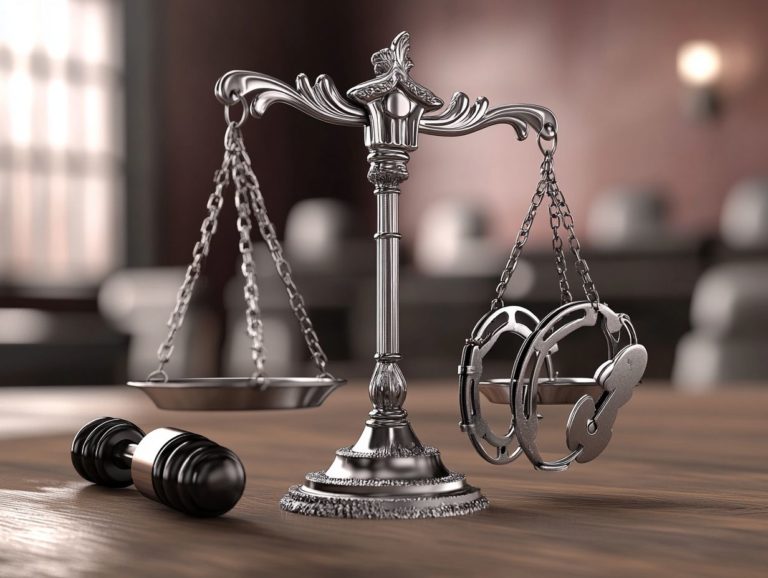Understanding Bail and Your Rights
Bail is a vital component of the legal system. This article delves into the essential elements of bail, starting with its definition, the purpose it serves, and your rights throughout the process.
You ll discover the various types of bail, the steps from arrest to release, and the factors that can influence bail amounts. If you find yourself unable to afford bail, we ll discuss your options and the potential consequences of skipping out on bail. Understanding these elements can empower you during difficult times!
Contents
Key Takeaways:

Understand what bail is and its purpose: a way for the accused to be released from custody while awaiting trial.
Know your rights when dealing with bail: constitutional protections ensure that bail is not excessive and cannot be used as punishment.
Be aware of the different types of bail: cash, surety bond, and personal recognizance are common types.
Factors such as the severity of the crime and past criminal history can affect the bail amount.
What is Bail?
Bail serves as a crucial legal mechanism that enables you to secure your release from custody while awaiting trial. Its primary purpose is to ensure your appearance in court while balancing public safety and the rights protected under the Eighth Amendment.
In Utah, the bail system includes different types of bonds, such as cash bonds and surety bonds. These are often provided by bail agents and bond companies who guide you through the complexities of the criminal justice system.
Definition and Purpose
Bail is the amount of money or property you must provide to the court to secure your release from custody while facing criminal charges. This arrangement ensures that you will appear for your scheduled court dates and helps protect the public by evaluating the potential risk you may pose.
Bail amounts are determined by several factors, including the severity of the alleged crime, your criminal history, and your ties to the community. If you fail to comply with the conditions of your bail, such as skipping court appearances, the consequences can be severe. This may lead to the forfeiture of your bail amount and additional legal penalties.
This balance of accountability and public safety highlights the critical role that bail plays in the judicial process.
Your Rights when Dealing with Bail
When navigating the complexities of bail, you have specific rights designed to safeguard you against excessive bail amounts and ensure your access to understanding the right to bail and legal counsel.
These rights embody the protections granted under the Eighth Amendment, affirming your dignity and ensuring fairness in the legal process.
Constitutional Protections
The Eighth Amendment of the United States Constitution ensures that excessive bail shall not be required. This lays down a crucial protection for you as a defendant in the bail process.
This clause promotes fairness within the judicial system by preventing financial discrimination against individuals accused of crimes. When courts determine appropriate bail amounts, they must weigh the nature of the offense, your criminal history, and the risk of flight.
In Utah, several case law precedents demonstrate how judges interpret these protections, reinforcing that bail should be set at a reasonable and just level. Notable rulings show that excessive bail threatens the presumption of innocence and invites discussions about the socio-economic disparities faced by defendants.
Through ongoing litigation and court opinions, the state continually refines its approach to uphold these essential constitutional safeguards for all citizens, including you.
Types of Bail

Understanding the different types of bail available is essential for you as a defendant seeking pretrial release. You have options such as:
- Cash Bail: A set amount paid in cash to secure your release.
- Surety Bonds: A bond provided by a bail agent, who ensures your appearance in court.
- Property Bonds: Using property as collateral to secure bail.
These options allow you to select the most suitable choice based on your financial resources and the specifics of your charges.
If you have further questions or need assistance, don t hesitate to seek help from legal professionals! Understanding your rights is crucial.
Cash Bail, Surety Bond, and Personal Recognizance
Among the most common types of bail available to you are cash bail, surety bonds, and personal recognizance. Each presents unique avenues for securing your release from custody while you await trial.
Each option carries its own implications regarding financial responsibility and your interaction with the judicial system. With cash bail, you re required to pay the full amount upfront. This can impose a significant financial burden, tying up your resources during a stressful time.
A surety bond is when someone else, like a bondsman, pays the bail for you in exchange for a non-refundable fee. This option alleviates some immediate financial strain but still holds you accountable for appearing in court; failing to do so could risk the bond.
Then there s personal recognizance, which allows for your release without any financial payment. Instead, it hinges on your promise to return for future court dates, placing the emphasis on trust rather than monetary exchange.
The Bail Process
The bail process unfolds as a meticulously structured sequence of steps, starting with a defendant’s arrest. This is followed by a bail hearing, during which the court evaluates the conditions for release.
Several factors come into play, including the nature of the charges and the defendant’s potential risk to public safety.
Steps from Arrest to Release
The journey from arrest to release on bail involves several critical steps that you must navigate. It starts with the initial arrest, potentially moves into booking, and culminates in the bail hearing, where the conditions for your release are determined.
During your initial arrest, law enforcement officers will typically inform you of your rights and document any evidence related to the alleged offense. Following this, the booking process records your personal information in the system, along with details of the offense, fingerprints, and photographs. This stage is crucial, as it sets the groundwork for any future legal proceedings.
Once you ve been booked, you ll face a bail hearing a pivotal moment that will determine whether you can secure release before trial. In this setting, a judge will evaluate various factors, including your flight risk, criminal history, and the nature of the charges. This often leads to specific conditions that may accompany your bail, such as travel restrictions or regular check-ins with authorities.
Factors Affecting Bail Amount
Several key factors will influence the determination of a defendant’s bail amount. These include the severity of the charges they face, their financial resources, any previous criminal history, and the perceived risk they pose to the community.
Criteria for Determining Bail

The criteria for determining bail require a thorough assessment of your situation. This takes into account factors such as the nature of the charges, your community ties, and the risk of flight.
This evaluation dives deep into your situation, ensuring community safety is prioritized. It often involves a detailed examination of risk assessments that gauge the likelihood of reoffending or failing to appear in court.
Courts in different jurisdictions may apply varying benchmarks when considering these factors, reflecting local norms and legal precedents.
Your legal counsel plays a pivotal role in this process. They advocate on your behalf by presenting compelling evidence that could sway the court s decision. They strive to highlight your relationships and responsibilities, aiming to assure the court of your commitment to fulfill all legal obligations. This advocacy can significantly influence the outcome of your bail hearing.
Options if You Cannot Afford Bail
If you find yourself unable to afford bail, a range of alternative options is available. One possibility is to seek a bail bond through a reputable bondsman, who can assist you in navigating the financial complexities.
You can also explore pretrial release programs for assistance. Act now to explore these programs that can help you regain your freedom!
Alternative Release Options
Alternative release options available to you include bail bonds, pretrial release, and, in some cases, house arrest. Each of these choices offers varying degrees of freedom while requiring strict adherence to conditions set by the court.
As you consider these options, remember that each comes with its own set of criteria that can significantly affect your daily life.
- For example, opting for bail bonds typically necessitates a financial guarantee, which could place a considerable strain on you or your loved ones.
- Pretrial release may involve stipulations such as regular check-ins with a supervising officer or travel restrictions that limit your mobility.
- House arrest, meanwhile, can severely curtail your freedom, often requiring electronic monitoring devices that track your movements.
Understanding these alternatives is crucial as you navigate your legal challenges. Non-compliance can lead to serious repercussions, including the revocation of your release and the possibility of incarceration.
Consequences of Skipping Bail
Skipping bail can result in severe repercussions, including legal penalties, the forfeiture of your bail amount, and potential additional charges that could complicate your legal situation.
It s essential to understand the gravity of this decision and the long-term implications it may have on your case.
Legal Penalties and Implications
Legal penalties for skipping bail can be quite severe, often involving the forfeiture of the bail amount along with the potential for additional criminal charges. This can significantly hinder your ability to secure bail in the future.
When you skip bail, you may face charges for bail jumping, which could be categorized as either a misdemeanor or a felony, depending on your location and the specifics of your case. For example, if you fail to appear for a court date related to a theft charge, you might end up with an additional felony charge, complicating your legal situation even further.
The consequences of such actions can go beyond immediate penalties. Previous instances of bail jumping can negatively affect a judge’s perception of you, potentially resulting in stricter bail conditions or even outright denial of future bail requests. This not only prolongs your legal troubles but could also lead to more severe sentencing outcomes in the future.
Frequently Asked Questions

What does it mean to post bail?
Bail is a financial deposit or security given to the court in exchange for the temporary release of a person accused of a crime. This is a promise to appear in court for all required hearings and proceedings.
What is the purpose of bail?
The main purpose of bail is to ensure that the accused will return to court for their trial. It also allows the accused to be temporarily released from jail while awaiting trial.
How is the amount of bail determined?
A judge typically sets the amount of bail based on the severity of the crime, the defendant’s criminal history, and flight risk. In some cases, the amount may be set according to a bail schedule.
Can the amount of bail be changed?
Yes, the amount of bail can be adjusted. If the accused cannot afford the set amount, they can request a bail hearing to have the amount lowered or to be released without having to pay bail.
What happens if I cannot afford bail?
If you cannot afford bail, you may seek the assistance of a bail bondsman. They will charge a non-refundable fee (usually 10% of the bail amount) and will post the full bail with the court. However, if the accused fails to appear in court, the bondsman may be held responsible for paying the full bail amount.
What are my rights when posting bail?
You have the right to know the charges against you, the amount of bail set, and the conditions of your release. You also have the right to an attorney and to request a bail hearing if you cannot afford the set amount. It’s important to understand conditional release and your rights before posting bail.
If you are facing bail issues, it’s vital to seek legal advice to navigate your situation effectively.






